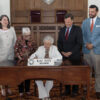During a speedy meeting Wednesday afternoon, the House Education Policy Committee favorably reported two controversial bills after minor changes meant to assuage concerns expressed by legislators and educators earlier in the session.
HB178, introduced and supported by Rep. Mark Gidley, R-Hokes Bluff, would require all K-12 schools to publicly display the Ten Commandments in public spaces and rooms primarily used for history classes.
Posters mandated under the law would also feature statements about a letter John Quincy Adams wrote to his son, the Mayflower Compact, and the Northwest Ordinance of 1787 all intended to show the role of religion in American history. An acknowledgement that under the Alabama Constitution “no religion shall be established by law” would be required as well.
Last week Alabama House Minority Leader Anthony Daniels, D-Huntsville, who did not attend the meeting yesterday, asked how exactly the mandate could be enforced given schools would not be awarded state funds to purchase the posters.
Rep. Marcus Paramore, R-Troy, also wanted more clarification about how Alabama’s public universities, particularly Troy University, would be affected.
Due to these concerns, Rep. Terri Collins, R-Decatur, requested a motion for favorable report be withdrawn and the bill revised before the committee met again.
In the substitute version of the bill accepted and favorably reported by the committee yesterday, both concerns have been addressed. All mentions of institutes of higher education were removed from the text and a clause was added making the requirement “subject to the availability of donated funds or donated displays … as determined by the State Superintendent of Education.”
Gidley told the committee the new version is “exactly the same bill you had last week, except it deals with some of the questions you had.”
The introduction of HB178 follows a very similar bill being passed and signed into law in Louisiana. Piper Hutchinson of the Louisiana Illuminator reports that Louisiana Attorney General Liz Murrill has also stressed posters featuring the Ten Commandments required by that state’s law should be either donated or paid for with donated funds.
Despite the shared requirement to use donated posters and funds though, and similar attempts at ensuring the posters provide secular context, the Louisiana law was found to be “unconstitutional on its face” by a federal judge this past November who blocked its implementation in five parishes.
The official position of the ACLU of Alabama is that, like the Louisiana version, HB178 is also “unconstitutional – plain and simple.”
“The First Amendment guarantees that students and their families —not politicians or the government—get to decide which religious beliefs, if any, they adopt and what role those beliefs will play in their lives,” the organization stated. “Displaying the Ten Commandments in public-school classrooms blatantly violates this promise. Students can’t focus on learning if they don’t feel safe and welcome in their schools.”
The other controversial bill favorably reported by the committee on Wednesday, HB244, is another attempt by Rep. Mack Butler, R-Gadsden, to expand Alabama’s so-called “Don’t Say Gay” law.
Passed by the state legislature and signed by Gov. Kay Ivey in 2022, the “Don’t Say Gay Law,” a popular epithet among the law’s critics, prohibits classroom discussion of “sexual orientation or gender identity in a manner that is not age appropriate or developmentally appropriate for students in accordance with state standards” in Kindergarten through 5th grade.
Butler already attempted to expand the scope of the law last session. His proposal was passed by the state House after a floor amendment reduced its scope, but failed to see a vote in the Senate before the session ended.
“HB244 is an expansion of what we passed last year with just a couple of tweaks,” Butler explained to the committee. “The biggest one is that we had K-12 last year, it was amended on the floor to K-8. This one is pre-K through 12.”
Butler also pointed to the number of applicants for funding under the CHOOSE Act, Alabama’s school choice program, suggesting that it represented wider discontent with public schools his legislation could help alleviate.
As introduced, HB244 would additionally have prohibited employees of public schools from displaying “a flag or other insignia relating to or representing sexual orientation or gender identity” on school property and banned intentionally using pronouns “inconsistent with [students’] biological sex at birth.”
A friendly amendment adopted by the committee yesterday drastically dialed back both of these provisions though. The ban on using transgender students’ preferred pronouns was dropped entirely and the restrictions on flags and other insignia was changed to only apply inside classrooms, not on school property generally.
After the amendment was read aloud, Rep. Tracy Estes, R-Winfield, asked Butler if deleting section C of the initial bill “is not gutting half your bill.”
“No, all that did was remove the pronoun portion,” Butler responded. “The main gist of the bill was to expand the existing law pre-K through 12. And that’s what prohibits classroom discussions of gender identity or sexual orientation.”
“We’re trying to get as close as we could to President Trump’s executive order,” Butler said, likely in reference to the Jan. 29 EO “Ending Radical Indoctrination in K-12 Schooling.”
The House committee also favorably reported HB416, a bill to place more automated external defibrillators on school grounds, and HB57, a bill to prevent K-12 schools from withholding transcripts over unpaid balances.
“There’s a lot of things you can do, but messing with a kid’s transcripts is a little much to me,” HB57’s sponsor Rep. Matt Simpson, R-Baldwin, explained.
The bills favorably reported by the House Education Policy Committee yesterday still need to be passed by the House, the Senate, and signed by the governor in order to become law, and could still be altered by successful floor amendments.

















































